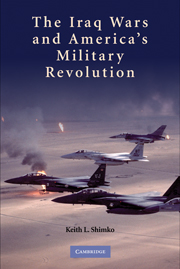Book contents
- Frontmatter
- Contents
- Acknowledgments
- 1 Military Revolutions and the Iraq Wars
- 2 From Vietnam to Iraq – The Rebirth of American Military Power and the Origins of an RMA
- 3 The First Iraq War, 1991 – A Revolution Dawns?
- 4 The Iraqi Interregnum, 1991–2000
- 5 Afghanistan and the Second Iraq War, 2001–2003 – A Revolution Confirmed?
- 6 The Third Iraq War, 2003–? – A Revolution Denied?
- Conclusion: The Future of America's Military Revolution
- Index
- References
3 - The First Iraq War, 1991 – A Revolution Dawns?
Published online by Cambridge University Press: 05 June 2012
- Frontmatter
- Contents
- Acknowledgments
- 1 Military Revolutions and the Iraq Wars
- 2 From Vietnam to Iraq – The Rebirth of American Military Power and the Origins of an RMA
- 3 The First Iraq War, 1991 – A Revolution Dawns?
- 4 The Iraqi Interregnum, 1991–2000
- 5 Afghanistan and the Second Iraq War, 2001–2003 – A Revolution Confirmed?
- 6 The Third Iraq War, 2003–? – A Revolution Denied?
- Conclusion: The Future of America's Military Revolution
- Index
- References
Summary
The Road to War
Although there had been indications toward the end of July of suspicious Iraqi troop movements, the August 2, 1990, invasion of Kuwait came as a surprise to almost everyone. The invasion was swift as the Kuwaiti military was able to offer only token resistance. Kuwaitis able to flee the country did so, leaving their less fortunate compatriots to suffer Iraq's brutal occupation. Saddam no doubt hoped the speed of conquest would present the world with a fait accompli. No one in the region possessed the military power to evict Iraq by force, and there was little reason for him to think that more distant powers would intervene on Kuwait's behalf. He must have expected that the world would eventually come to terms, however grudgingly, with Kuwait's incorporation into Iraq. Within a week of the invasion the conquest was complete, and Kuwait was declared part of a new nineteenth province of Iraq. Kuwait had ceased to exist as an independent state before anyone had a chance to react.
In that first week, however, Kuwait's fate was not the most immediate concern. There was little that could be done at the moment for Kuwait. The more pressing issue was whether the conquest of Kuwait was an end in itself or merely the prelude to an attack on the bigger prize of Saudi Arabia. Although the Saudi military might put up more of a fight, most bets would have been on Iraq in that matchup.
- Type
- Chapter
- Information
- The Iraq Wars and America's Military Revolution , pp. 53 - 90Publisher: Cambridge University PressPrint publication year: 2010

